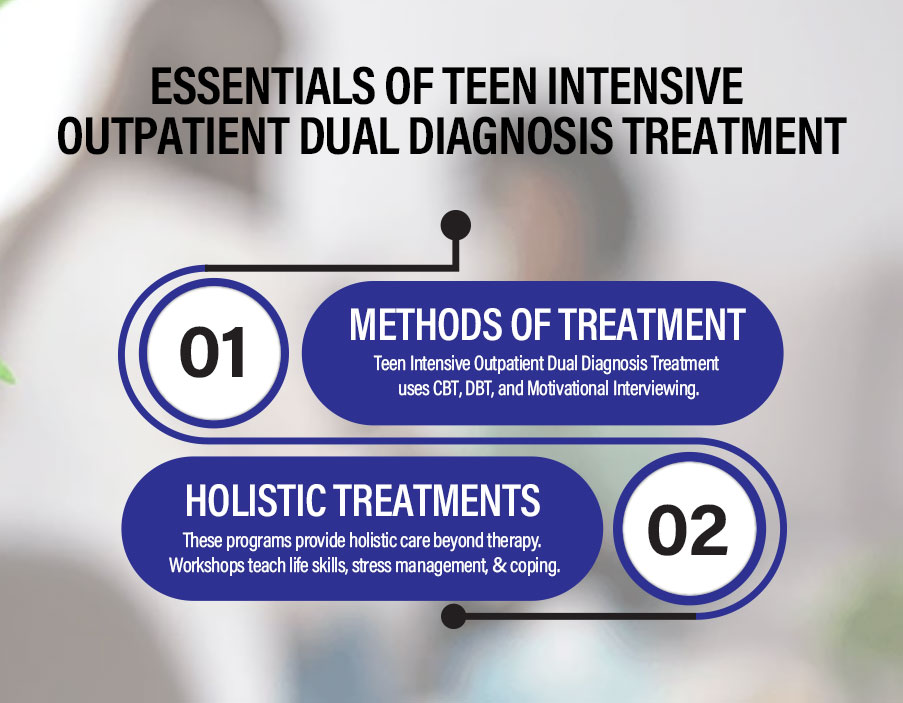Teens face identity exploration, mental health issues, and substance usage as they navigate adolescence. Alarmingly, 20% of teens have mental health disorders, and the rise in teen substance use compounds these issues.
Teen intensive outpatient programs (IOPs) are the lanterns in these storms. These programs are lifelines, not just aid. Imagine a structured safety net that supports teens and lets them keep their everyday routines while recovering and growing. This combination of formal supervision and established routines gives teens hope for navigating adolescence.
Teen IOPs foster resilience and growth as sanctuaries. They enable teens to weather future storms as well as solve immediate issues. Their complete safety net gives teens hope and allows them to continue their academic, family, and social lives. A delicate balance between specialized counsel and everyday rhythms anchors teenagehood’s turbulent seas.
What is a Teen Intensive Outpatient Program?
Teen intensive outpatient programs (IOPs) are specially designed for adolescents with mental health or substance use disorders. These programs provide intense care outside of a residential facility, allowing participants to continue their schooling, family, and social life.
An Intensive Outpatient Program is a planned treatment plan that includes weekly therapy, counseling, and education sessions. The goal is to provide comprehensive care in a supportive home or setting.
Key Components and Structure of an IOP
Individual treatment, group therapy, family sessions, psychiatric evaluation, and medication management are standard in IOPs. These components complement one other to treat a teen’s mental health or substance use disorder.
Differences in Teen-Specific IOPs
Teen IOPs are unique owing to their focus. These programs use age-appropriate treatment methods, peer support, and activities to appeal to teenagers. They also include educational elements to help kids manage schoolwork while in treatment.
Dual Diagnosis in Teens
Dual diagnosis is having a mental health and drug use issue. As these diseases can worsen each other, adolescents can fall into a cycle of mental health disorders and substance usage. Teens may self-medicate with drugs to cope with anxiety or depression, harming their mental health.
Nearly 60% of teenagers with substance use disorders also have mental health disorders, a troubling trend. This demographic struggles with anxiety, sadness, ADHD, bipolar disorder, and substance misuse.
Dual Diagnosis in Teens
Treating dual diagnosis in teens is complicated owing to mental health and substance addiction. Diagnosis is difficult since symptoms might disguise or worsen one ailment. Teens may also refuse treatment or be stigmatized, preventing them from seeking help.
Customized Intensive Outpatient Dual Diagnosis Programs
Essential For Teen Intensive Outpatient Dual Diagnosis Treatment

Methods of Treatment
Teen intensive outpatient dual diagnosis treatment uses CBT, DBT, and Motivational Interviewing. Teens learn to identify triggers, manage cravings, and cope with mental health and substance use concerns with these methods.
Holistic Treatments
These programs provide holistic care beyond therapy. Workshops teach life skills, stress management, and coping. Family support is crucial for teen rehabilitation.
Advantages and Results
Teen IOPs Help Recovery
Teen intensive outpatient programs improve recovery and well-being. Better emotional control, coping skills, and mental health and substance use management are common among participants.
Relapse Prevention and Long-Term Results
These programs often have long-term effects. These programs give teenagers coping skills and a support network to avoid relapses and overcome future obstacles.
Considerations for Families and Teens
Families seeking treatment for dual-diagnosed kids should prioritize open communication. Supportive, non-judgmental conversations about mental health and substance use can inspire youth to seek treatment. Families must consult mental health professionals or adolescent support groups.
Recognizing IOP Need
The indications of an intensive outpatient program must be recognized. This may include rapid behavior changes, academic decline, social disengagement, or substance abuse. A healthcare professional can advise you.
Families and teens should ask about the methodology of intensive outpatient dual diagnosis programs, success rates, staff credentials, and family participation. Tour facilities, ask questions, and make sure the program meets the teen’s needs.
Overcoming Stigma and Misconceptions
There are several misconceptions about teen IOPs and dual diagnosis treatment. Some think such programs are for severe instances or stigmatize teens. Addressing these myths by emphasizing the inclusion, efficacy, and normality of receiving help is vital.
Teens need mental health and addiction therapy de-stigmatized to seek help. Promoting mental health conversations, educating communities, and reframing treatment as a strength can help stigmatize.
Read More: Strengthening Bonds: Exploring Family Therapy Goals and Objectives
Conclusion
Teen Intensive outpatient dual diagnosis programs offer hope to teens with mental health and substance use issues. These programs teach teens resiliency and help them succeed in life while providing thorough therapy.
We must encourage folks in such situations to seek help. Teens and their families can heal and progress by using tools, joining supportive networks, and consulting specialists. With support, people can overcome these obstacles and build better futures.”
FAQs
Teen IOPs are structured treatment plans for adolescents with mental health and substance use difficulties. IOPs provide full support while teens stay home, unlike inpatient care.
Sudden behavioral changes, deteriorating academic performance, social withdrawal, or substance concerns may manifest. Healthcare professionals can advise.
These programs use CBT and DBT, which are evidence-based therapies. These include family support, educational programs, and peer group talks.
That’s a major IOP benefit. Teens can balance school and family life with scheduled therapy.
Teen IOPs help teens avoid relapse by teaching coping skills. In general, long-term well-being and good health generally get better.

